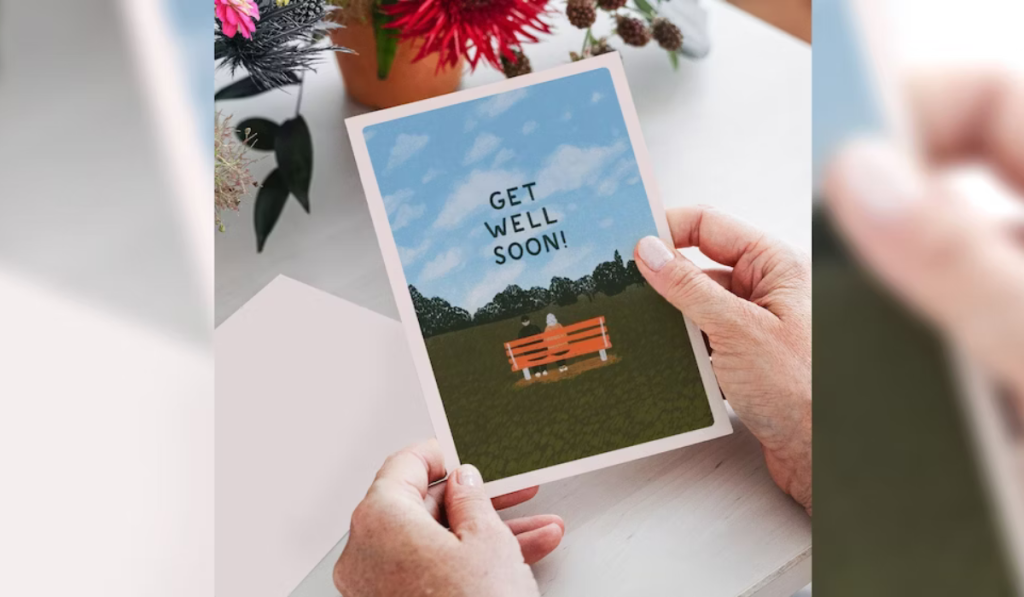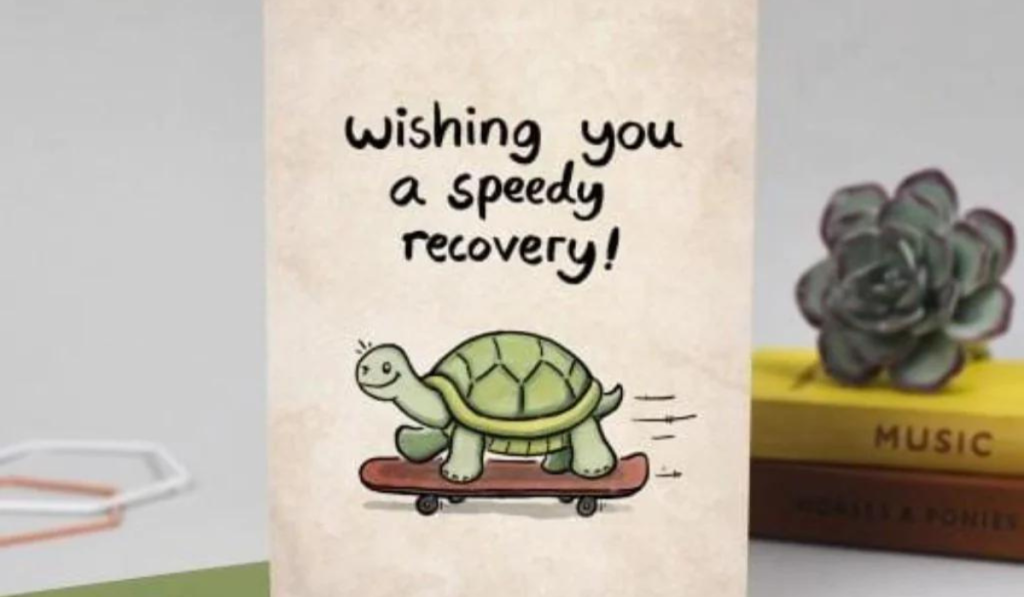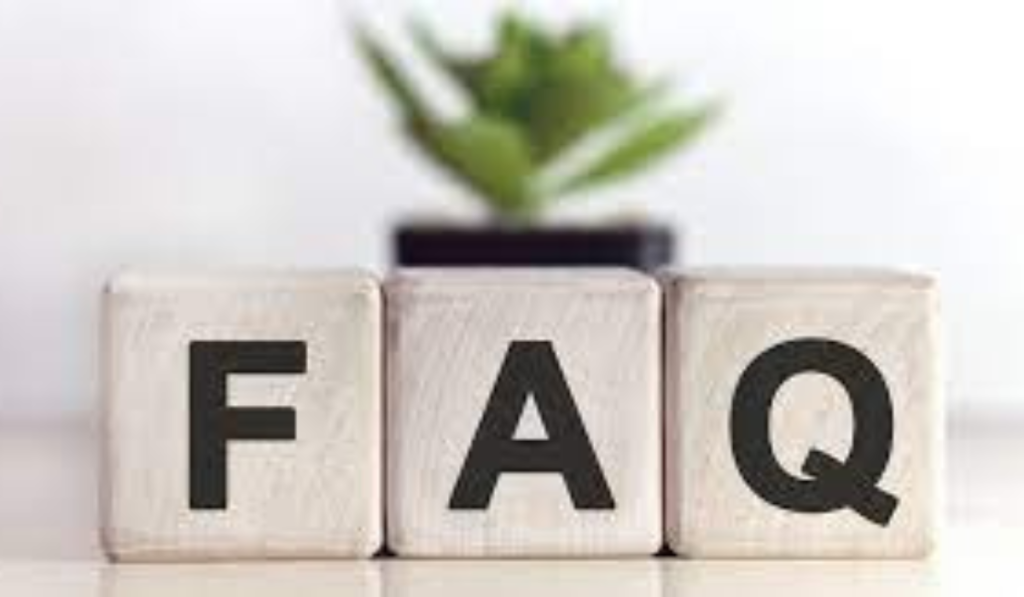Infuse joy into the recovery journey with our guide to creating cheerful get-well greetings. Explore uplifting messages designed to bring smiles and positive energy to your loved ones. Read our guide on what to write in a get well card for all the scoop.
In moments of illness, a heartfelt gesture can often speak louder than words. When someone we care about is under the weather, a simple yet sincere get well card can be a powerful way to convey our well wishes and lift their spirits. In this blog, we will explore how to write a get well card, which is a small yet significant token of love and support.
Navigating the delicate balance between empathy and encouragement, a thoughtful message can bring comfort and warmth to the road to recovery. Whether you’re penning words for a friend, family member, or colleague, the aim is to strike a chord that resonates with the recipient, reminding them that they are not alone in their journey back to health.
Join us as we delve into the art of choosing the right words, offering solace, and spreading positivity through the written word. Discover simple yet impactful phrases that convey genuine care and provide a glimmer of hope during challenging times. Let’s explore how to write a get well card, foster healing, and remind our loved ones that brighter days are ahead.
Crafting Comfort: What to write in a get well card?
In times of illness, a heartfelt get well card can be a source of comfort and encouragement for someone going through a challenging time. The simple act of sending warm wishes can make a significant difference in lifting spirits and fostering a sense of connection. In this blog post, we’ll explore the art of writing a get well card, offering guidance on what to write and how to convey genuine sentiments in a meaningful way.
- Begin with empathy
- Share positive memories
- Express your support
- Choose uplifting words
- Personalize the message
- Include inspirational quotes
- Avoid clichés
- Keep it light
- Offer encouragement
- Conclude with a warm closing

Begin with empathy
Start your get well card with a genuine expression of empathy. Acknowledge the person’s illness and let them know that you are thinking of them during this difficult time. A simple “I’m sorry to hear that you’re not feeling well” can set the tone for a caring and compassionate message.
Share positive memories
Bring a smile to the recipient’s face by sharing a positive memory or a lighthearted anecdote. Remind them of happier times or recount a funny incident that you both experienced. This can help divert their attention from the current challenges and evoke positive emotions.
Express your support:
Clearly convey your support and willingness to help. Offer specific assistance, such as running errands, preparing meals, or being a listening ear. Knowing that there is a support system in place can be immensely comforting for someone going through a tough time.
Choose uplifting words:
Opt for uplifting and optimistic words in your get well card. Encourage the person to stay positive and remind them that brighter days are ahead. Phrases like “Wishing you a speedy recovery” and “Looking forward to seeing you back on your feet” can instill hope and positivity.
Personalize the message:
Make the message personal by referencing the individual’s interests or hobbies. If you know they enjoy a particular activity or have a favorite pastime, mention it in your card. This shows that you took the time to tailor your message to the recipient, making it more meaningful.
Include inspirational quotes:
Incorporate inspirational quotes or uplifting messages that resonate with the theme of recovery. Quotes from well-known figures or even simple, heartfelt phrases can serve as a source of motivation and encouragement. Be sure to choose quotes that align with the recipient’s personality and beliefs.
Avoid clichés:
While it’s essential to be positive, try to avoid clichés that may come across as insincere. Phrases like “Get well soon” or “Everything happens for a reason” are well-intentioned but may lack the personal touch that a genuine message conveys. Instead, opt for heartfelt and unique expressions of care.
Keep it light:
Maintain a light and cheerful tone in your get well card. Humor, when appropriate, can be a powerful tool to uplift spirits. Share a funny joke or a witty remark, but be mindful of the recipient’s sense of humor and the nature of their illness.
Offer encouragement:
In addition to expressing well wishes, offer words of encouragement. Let the person know that you believe in their strength and resilience. Encourage them to take things one step at a time and reassure them that they are not alone in their journey toward recovery.
Conclude with warm closing:
End your get well card with a warm closing that reinforces your sentiments. Classic closings like “Thinking of you,” “Sending healing thoughts,” or “With warmest wishes for a speedy recovery” can add a final touch of sincerity to your message.
Summary
Writing a get well card is a thoughtful way to show someone that you care. By combining empathy, positive memories, support, uplifting words, personalization, inspirational quotes, avoidance of clichés, a light tone, encouragement, and a warm closing, you can create a message that brings comfort and solace to the recipient. Remember, it’s the genuine intention behind your words that makes a get well card a powerful gesture of compassion and support.
Crafting humorous get well messages for various situations
When it comes to supporting our friends and loved ones during challenging times, such as recovery from illness, surgery, or an accident, injecting a dose of humor into a get well card can be just the right medicine. In this guide, we’ll explore the art of writing funny get well messages tailored to different situations, offering lighthearted and uplifting sentiments to brighten the road to recovery. We will also answer the following questions
- What to write in a funny get well card?
- What to write in a get well card after surgery is funny?
- What to write to an accident get well card?
What to write in a funny get well card:
Begin your funny get well card with a cheerful greeting and a touch of humor. Start by acknowledging the situation with a light-hearted tone. For example, “Heard you caught a bug – hope it’s not the dancing kind!” Humor can be a great way to lift spirits and break the ice.
What to write in a get well card after surgery funny:
Surgery can be a serious affair, but that doesn’t mean your get well message can’t be light-hearted. Reference the surgery in a playful manner, such as, “Congratulations on your upgraded parts! Wishing you a speedy recovery and a future filled with bionic strength.” Acknowledge the discomfort humorously, “They say laughter is the best medicine, but I’m pretty sure it’s painkillers. Get well soon!”
What to write to an accident get well card:
Accidents can be challenging, but injecting humor can help ease the tension. Begin with a witty acknowledgement, “I heard about your little stunt – next time, leave the acrobatics to the professionals!” Express your concern with a playful twist, “Your mishap has added a new chapter to the book of legendary tales. Get well soon so we can turn the page together!”

Injecting puns and playful wordings:
Incorporate puns and playful wordings related to the specific situation. For instance, “Heard you’re laid up – just taking a break to keep life interesting, huh?” or “They say laughter is contagious, so I’m sending you a hefty dose – doctor’s orders!”
Customizing humor to the recipient:
Consider the recipient’s personality and interests when injecting humor. If they enjoy wordplay, use puns. If they appreciate wit, incorporate clever remarks. For example, “I know you always wanted a spa day, but I think breaking a leg is a bit extreme!”
Maintaining sensitivity:
While humor is valuable, always maintain sensitivity to the severity of the situation. Avoid jokes that may be inappropriate or offensive. The goal is to uplift and bring joy, not to trivialize the person’s experience.
Offering genuine well wishes:
Beneath the humor, ensure your message carries genuine well wishes. Conclude your funny get well card by expressing sincere hopes for a speedy and smooth recovery. A balance of humor and heartfelt sentiments creates a message that is both supportive and uplifting.
In a nutshell
In times of recovery, laughter truly can be the best medicine. Crafting funny get well messages tailored to the specific situation shows thoughtfulness and consideration. These messages not only lift the spirits of the person on the mend but also strengthen the bonds of friendship and support. So, go ahead, let your creativity flow, and bring a smile to someone’s face as they navigate the path to wellness with your uniquely funny and heartwarming well wishes.
Navigating sensitivity: What not to write in a get well soon card?
Sending a get well soon card is a thoughtful gesture to uplift someone’s spirits during a challenging time. However, it’s crucial to tread carefully to ensure your words bring comfort rather than discomfort. In this mini-blog, we’ll explore what not to write in a get well soon card, understanding that sensitivity and respect are paramount in conveying support.
- Avoid downplaying the severity
- Steer clear of unsolicited advice
- Refrain from comparisons
- Don’t use overly casual language
- Refrain from overly religious statements
- Skip overly personal details
- Don’t make light of the situation
- Avoid mentioning weight or appearance
Avoid downplaying the severity:
While optimism is encouraged, avoid downplaying the severity of the illness or situation. Phrases like “It’s just a cold, no big deal” may unintentionally minimize the person’s experience. Instead, acknowledge the challenges they may be facing and express genuine empathy.
Steer clear of unsolicited advice:
Offering unsolicited advice, especially if you’re not a medical professional, can be counterproductive. Instead of saying, “You should try this remedy,” opt for supportive statements like, “I hope you find comfort and relief soon,” allowing the person to manage their health as they see fit.
Refrain from comparisons:
Avoid making comparisons to others’ experiences, as everyone’s journey to recovery is unique. Saying, “My friend had the same thing and recovered in a week,” may inadvertently create unrealistic expectations. Focus on the individual’s situation and offer encouragement without making comparisons.
Don’t use overly casual language:
While a friendly tone is encouraged, using overly casual language may not be appropriate for all situations. Phrases like, “No worries, you’ll bounce back in no time,” might come across as dismissive. Tailor your language to the severity of the illness and your relationship with the person.
Refrain from overly religious statements:
While some individuals find solace in faith, others may not share the same beliefs. Avoid overly religious statements such as, “It’s God’s plan,” unless you are certain it aligns with the person’s beliefs. Instead, offer general well wishes and support.
Skip overly personal details:
Refrain from sharing overly personal details about your own experiences with illness, especially if they don’t directly relate to the person’s situation. Keep the focus on their well-being rather than shifting attention to your own experiences.
Don’t make light of the situation:
Humor can be a powerful tool, but making light of a serious situation may not be well-received. Avoid jokes or comments that may unintentionally trivialize the person’s pain or challenges. Opt for a more empathetic and supportive tone.
Avoid mentioning weight or appearance:
Comments related to weight or physical appearance, even if well-intended, should be avoided. Phrases like, “Maybe you’ll lose a few pounds during this recovery,” can be insensitive. Focus on expressing care and concern for their well-being without bringing body image into the conversation.
FAQs: What to write in a get well card?

How do I convey empathy in a get well soon card?
Begin by expressing genuine concern and understanding of their situation. Use comforting language and assure them that you’re thinking of them during this challenging time.
Can I share personal stories in a get well message?
Yes, sharing positive and uplifting personal stories can be a great way to connect and bring a smile to their face. However, be mindful of the tone and relevance to the individual’s situation.
What are some inspirational quotes for a get well card?
“Wishing you a speedy recovery and the strength to overcome. You’re stronger than you know!” or “Healing is a matter of time, but it is sometimes also a matter of opportunity.”
Are there any phrases to avoid in a get well card?
Avoid downplaying the severity of the illness, offering unsolicited advice, making comparisons to others, and using overly casual or insensitive language.
Conclusion
In the end, you should remember that your words are a powerful source of comfort and support.
A simple get-well card can leave a lasting impact, providing solace during challenging times. Whether through heartfelt wishes or encouraging sentiments, your thoughtful words contribute to the healing journey. So craft that perfect get well card to your sick loved ones and brighten up their day!
Click here